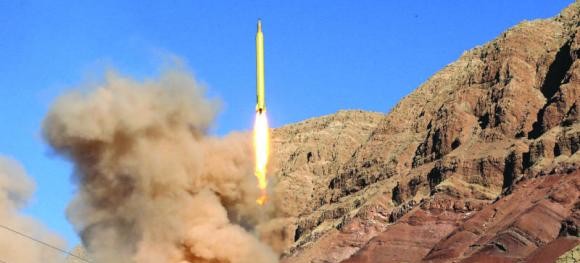PHOTO: Iran’s launch of a Qiam-1 ballistic missile, March 2016
LATEST
The US and Russia have each criticized the UN for its latest report on Iran’s ballistic missile testing.
In a rare alignment with Tehran, the US said UN Secretary-General Ban Ki-Moon had exceeded his mandate on supervision of Iran’s nuclear program.
“The United States disagrees strongly with elements of this report, including that its content goes beyond the appropriate scope. We understand that Iran also disagrees strongly with parts of the report,” the US Ambassador to the UN, Samantha Power, told the Security Council.
Russia’s UN Ambassador Vitaly Churkin said on Monday that Ban’s report contains factual errors. He added, “Some of the provisions of the Secretary-General’s report have no relation to his mandate, nor to the terms of reference of [the Council] resolution or the [nuclear deal].”
Before US Ambassador Power made her remarks, Iranian Foreign Ministry spokesman Bahram Qassemi said that Ban’s “unbalanced and biased” report had been prepared “under Washington’s pressure”:
The international community expects the UN Secretary-General to clearly and explicitly mention the cases of failure of the US and some other members of the 5+1 Powers [Russia, China, the US, Britain, France, and Germany] to fulfill their commitments under the JCPOA [Joint Comprehensive Plan of Action].
Iran Missile Tests “Not Consistent” with Nuclear Deal
Ban’s comments were made in his first report on January’s implementation of the July 2015 nuclear deal. He said Iran’s missile tests, including launches in March, “are not consistent with the constructive spirit” of the agreement.
However, Ban stopped short of recommending action. He said that it was up to the Security Council to decide if its Resolution 2231, passed at the time of the nuclear deal, had been violated.
After the leak of the report in the media earlier this month, Iran said that Ban had given into “political pressures” and demanded that he produce a “realistic and fair report” on US “shortcomings” in fulfilling its obligations under the nuclear agreement.
See Iran Daily, July 9: Tehran Challenges UN Criticism of Ballistic Missile Tests
The US has begun to lift sanctions after January’s implementation; however, Washington has imposed new measures on Iranian individual and companies over the ballistic missile testing.
The US and European powers also called on the Security Council to enforce Resolution 2231, which bars further research and development of missiles capable of carrying nuclear warheads. Tehran responded that the Qiam missiles are not nuclear-capable.
Russia and China are likely to block any Council attempt to punish Iran.
Rouhani Congratulates Turkey’s Erdoğan on Defeat of Coup Attempt
President Rouhani has called Turkish counterpart Recep Tayyip Erdoğan to congratulate him on the defeat of last Friday’s coup attempt.
In phone conversation with President @RT_Erdogan, expressed contentment for the return of stability & security to Turkey. #TurkeyCoupAttempt
— Hassan Rouhani (@HassanRouhani) July 18, 2016
The Iranian President said to Erdoğan, “Hearing your message to the people to take to the streets in the early hours after the coup was reassuring to us.”
Rouhani made no apparent reference to Erdoğan’s crackdown on opponents since Saturday, including the detention and dismissal of thousands of troops, judges, and officials.
See Turkey Feature: Erdogan Pledges Purge of State Institutions
Instead, Rouhani implicitly accused foreign powers of supporting the coup:
“Peace and stability in Turkey contributes to peace and stability in the whole region and we have no doubt that some big powers and terrorists do not want Islamic countries to have stability.”
Iran’s leaders — fearing the effects of a coup on Iranian borders, on trade, and on the Islamic Republic’s internal situation — have issued a series of statements since Saturday praising the Turkish Government’s “victory of democracy”.
See Iran Daily, July 17: Tehran Hails “Victory of Democracy” in Turkey

